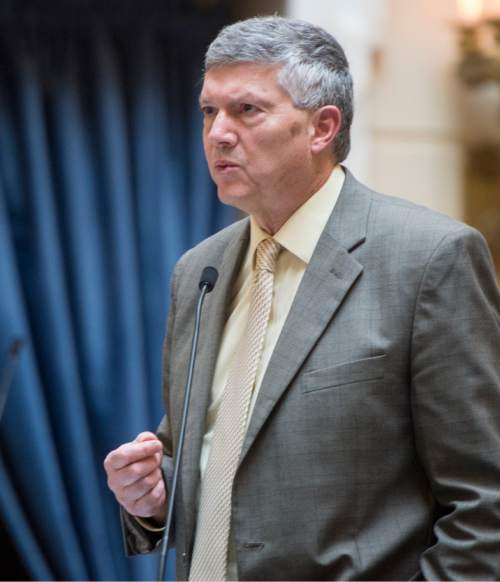This is an archived article that was published on sltrib.com in 2016, and information in the article may be outdated. It is provided only for personal research purposes and may not be reprinted.
The lesson of the 2016 Legislative session so far? Don't mess with mommy bloggers.
It was opposition from the blogger community and so-called "affiliate" marketers that appears to have doomed a bill aimed at collecting sales tax from online purchases — a gap in the current tax code that is currently costing Utah more than $180 million in lost revenue a year.
The bill was a priority for Utah retailers, Senate leaders and has been repeatedly pointed to for months as a crucial way for Utah to fund government needs in the years ahead.
But the bill sponsor, Rep. Mike McKell, R-Spanish Fork, walked away from the bill on Monday night — with just three days left in the session — concerned that he could cost an estimated 10,000 bloggers hundreds of thousands of dollars they are paid to promote goods for retail behemoth Amazon.
In an email to retailers, David Davis, president of the Utah Retail Association, which had worked for months lobbying lawmakers to support the legislation, said he believes there were enough votes to pass the bill last week and McKell stalled, then "in a very heated meeting" said Monday he wouldn't sponsor the bill.
"It appears at this point that the bill is dead for this session," Davis said.
The prospects for the bill took another major hit Tuesday night, when the House Revenue and Taxation Committee refused to pass a similar bill sponsored by Sen. Wayne Harper, R-Taylorsville, out of committee.
McKell said he pulled the plug on the bill because he had heard from scores of bloggers who would lose a source of income if the bill went through.
"In the end, what I determined was I wasn't able to fix the problem for our advertisers and bloggers across the state," McKell said.
The bloggers are paid by Amazon — the Moby Dick of online sales — to post links to products on their blog sites. That transaction was the commercial "nexus" that Utah planned to use to require Amazon to begin having to pay taxes on purchases Utahns make through the web platform.
But Amazon, in an email sent to McKell Monday evening, said it would terminate its relationships with the affiliate advertisers in Utah, cutting the strings to Utah and letting the White Whale off the hook.
"Given the fact that Amazon was really willing to pull those affiliate contracts, in the end there was no benefit to the state because we weren't going to collect that online sales tax and we were going to lose that revenue in income tax from those families," McKell said.
Davis said that he understands the concerns of the bloggers about possible loss of their income.
"On the other hand, we have brick-and-mortar businesses that are present here in the state that are employing Utahns, that are paying property taxes, that are paying payroll taxes, and our main streets are drying up," Davis said. "These are folks who I think add texture to our community, they support our local events here, our little league baseball teams. They're part of what makes our community a community."
Katie Reed is one of those mommy bloggers who told lawmakers that HB235 would have jeopardized her income. Her blog, "A Mother Thing," features recipes, design and fashion pointers, and occasional product reviews.
For the past five years, Amazon has periodically provided the Murray mother of three young boys between the ages of 1 and 5 with items to review and has paid her a small commission if people click through from her site to purchase the item. She makes about $100 a month, a small piece of what she makes blogging.
"I'm a full-time, stay-at-home mom, so blogging is my contribution to my family. It's how we bought our new house," she said. "It's how I make my living."
Other affiliates make much more, she said, some as much as $100,000 a year, money that would have disappeared if HB235 had passed.
Natalie Martins is an "affiliate marketer" who told the House committee that she was driven from California when that state tried to tax the Internet and the companies she promoted cut off contracts. She said she is a stay-at-home mom and uses the money she makes to pay for therapy for her child with autism.
It's not just the mommy bloggers who have such relationships with Amazon. Video gamers, photographers, music junkies and any other blog that can drive traffic to Amazon can participate as affiliates.
Reed remains wary that the bill may make a comeback, but for now she's pleased that it may not pass this session.
"Right now, it's a really good thing for us [that the bill appears dead] because every state this has been passed in, Amazon, as well as other companies, have completely pulled their affiliate programs and that affects us so much," she said in an interview Tuesday.
McKell's legislation was designed so that the general sales tax rate would be reduced to offset the taxes collected from Internet sales — meaning it would not generate new revenue for the state for the first several years, but would begin to bring money into state coffers as online sales increase in the coming years.
Having not made it through the House by the required deadline, and with Harper's bill defeated Tuesday night, the issue is almost certainly dead for this session, but McKell and others say they will continue to work on the issue over the summer, hoping to resolve the thorny issue by the 2017 legislative session.
Twitter: @RobertGehrke



